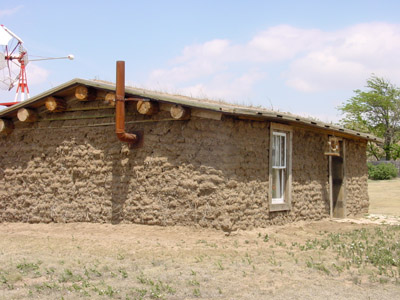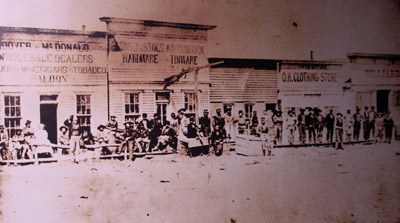
Across the Plains
May 21-23, 2002
May 21 - We left Madison on a cold morning, about 37 degrees at the condo. The drive to Lansing, KS was done without stopping, except for gas and other essentials. The weather was sunny, but windy, which blew the Roadtrek around quite a bit. It reminded me of the VW Microbus we used to have; driving it in the wind was sort of like sailing. We used to refer to it as "tacking" our way down the highway. Spent the night with Jerry and Ruth, Nancy's cousin, in Lansing and had a good visit with them.
May 22 - Even windier today, so I had to cut my speed down about 5 MPH from what I would have driven. You have to expect wind in the plains, but this seemed unusually strong. The radio weather report was "Wind Advisory", so perhaps it wasn't my imagination that the wind was stronger than normal. We stopped at Pawnee Rock, which is a 80 ft high sandstone cliff that was a landmark along the Santa Fe Trail as the setters made their way west. It used to be about 20 feet higher, but the early settlers and railroad crews quarried 20 feet of the top for building materials.

Pawnee Rock, a landmark on the Santa Fe Trail

View from the top of Pawnee Rock. In the mid 19th century, this view would have been grass and buffalo.
About 10 miles down the road from Pawnee Rock is the town of Larned, KS, where my great grandmother, Minerva Masterson, her children Jonathan (my grandfather) and Alzira, and second husband Ira Everman came in the late 1870s. Alzira got married in the town of Pawnee Rock and died there in 1880. Minerva, Ira, and Jonathan moved on to Dodge City. We stopped at the Santa Fe Trail museum in Larned and Fort Larned historical site.

Larned in 1878, about the time when Minerva and Jonathan were here.

A sod house, like those used by some of the early setters, in the Santa Fe
Trail museum.

The interior of the sod house. Can you imagine living in this year-round? It must have been quite an experience.
It was getting late, so we headed to Dodge City and settled in to a campground for the night.
May 23: Visited the Boot Hill museum in Dodge City. Minerva and Jonathan were in Dodge City in the late 1870's. Minerva's maiden name was Masterson; Bat Masterson was the sheriff of Dodge City from 1877-1878, so a family folklore has developed that we are related to the Mastersons. Nancy says that this is pure myth, since Bat was born in Quebec, and has no known connection to our Mastersons. I say that she needs to keep working on this until she gets it right; it is not nice to debunk long-cherished family stories.

Dodge city about 1875.

Bat Masterson
Next stop - somewhere in the mountains of Colorado.